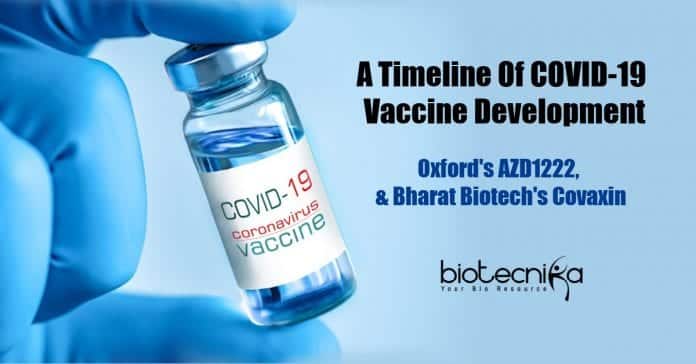A timeline of vaccine development: Oxford’s AZD1222, and Bharat Biotech’s Covaxin
Oxford and AstraZeneca’s COVID-19 vaccine AZD1222 is actually one of the biggest breakthroughs in the fight against COVID-19. The early trials of the vaccine have proven effective and safe. The outcomes of the result are published in the journal Lancet.
India’s first vaccine, ICMR, and Bharat Biotech’s Covaxin have also started human trials, as the global initiatives to combat the COVID-19 pandemic gain momentum. It may still take a while until we get a reliable and safe vaccine against COVID-19, there is still a long way that we have come.
A timeline of AZD122 vaccine development
April 2020: Sarah Gilbert, one of the lead scientists of the team who was developing the vaccine offered the world a ray of hope in the second week of April, that by September 2020 we might be able to get a COVID-19 vaccine. Sarah Gilbert is 80% certain that her team’s developments would be ready by September.
Matt Hancock, UK Health Secretary announced a week and a half later that, in the same week, Oxford University’s vaccine candidate would enter clinical trials. Matt Hancock had claimed that the government will supply 20 million
pounds to the Oxford research group to help fund their clinical tests, and for researchers at Imperial College London, they will be giving 22.5 million pounds as funds. The trials were flagged off after 2 days, and within the very same week, Serum Institute of India, headed by Adar Poonawala, stated that if the trials reveal positive outcomes, they will begin the production of the vaccine, and bring it into the market by October.It coincided with the time when clinical trials of Oxford University’s vaccine candidate in the animal models showed positive results. But, at the same time, Dr. William Haseltine, a previous Harvard Medical School professor revealed the outcomes of the trials being conducted at the National Institute of Health’s Rocky Mountain Laboratory in the US. It was found that the vaccine candidate can minimize the intensity of the condition but was unable to prevent infection in monkeys.
May 2020: Records of the vaccine prospect entering advanced human trials came to light about a month later. The University of Oxford stated in the last week of May, that the researchers have begun recruiting adults and children for advanced human trials of the vaccine and the trials will entail approximately 10,260 volunteers across the United Kingdom.
June 2020: The USA continued to be one of the most hit countries around the world, followed by Brazil by the 6th month of the pandemic. Researchers chose to check their vaccine candidate in Brazil, and trials were to began shortly to obtain a much better understanding of the effectiveness and safety of the virus and to fight the variable of herd immunity in the UK.
In June, Serum Institute of India and AstraZeneca finalized the deal to develop 1 billion vaccine candidate dosages in India. The trials in Brazil began in June, and one of the scientists stated that there was a chance that the jab would not work for older people. But, additionally, to manufacture Oxford’s COVID-19 vaccine candidate, Brazil entered an agreement with the British Pharma Giant.
July 2020: Oxford University’s COVID-19 vaccine candidate became a global topic, by raising hopes as well as emerging as one of the leaders in regards to speed and promise. Sarah Gilbert claimed that in people with reduced immunity also the vaccine works efficiently.
The outcomes of the first phases of trials carried out to check the safety and effectiveness of Oxford’s COVID-19 vaccine were released on 20th July 2020, and they were certainly favorable. Anyhow, further tests’ outcomes are required to conclude the safety and effectiveness of the vaccine, it would certainly not be wrong to claim that the world is now able to see a ray of hope.
Made In India Vaccine – Bharat Biotech and ICMR’s Covaxin
During the time when the world celebrated Oxford’s global achievement, India as a nation had something local to expect too. India released the very first trials of Covaxin – the home-grown made in India vaccine, while the talks about ‘Make in India’ and becoming ‘self-reliant’ as a nation was getting momentum during the pandemic.
May 2020: The Sars-Cov-2 vaccine strain was first isolated from the NIV, Pune, and later handed over to Bharat Biotech, to develop into a vaccine.
June 2020: It was reported in June, that the advancement of the vaccine was working out well as anticipated, and the entire month was crucial for vaccine advancement at Bharat Biotech. The firm has tremendous expertise in inactivated vaccines for polio, rabies, Zika, rotavirus, Chikungunya, Japanese Encephalitis, and currently for COVID-19.
Covaxin, ICMR, and Bharat Biotech’s home-grown vaccine got authorization in the last week of June from the Drug Controller General of India to carry out human trials of the vaccine.
July 2020: The clinical human trials of Covaxin started in the country in the second week of July. NIMS Hyderabad, AIIMS Delhi, AIIMS Patna, and PGI Rohtak are some of the institutes where the trials have currently started, and results are being eagerly anticipated. According to Dr. Randeep Guleria, the human trial of India’s first indigenously developed coronavirus vaccine has actually started at the AIIMS, New Delhi.
Balram Bhargava, Director General, ICMR mentioned that by August 15, 2020, ICMR intends to launch the indigenous COVID-19 vaccine. But, the last outcome will certainly rely on the participation of all clinical trial sites associated with this project. The ICMR had actually selected 12 institutes, consisting of one from Odisha, for the clinical trial of the nation’s first indigenous vaccine against COVID-19.
A timeline of vaccine development: Oxford’s AZD1222, and Bharat Biotech’s Covaxin
Author: Sruthi S






























